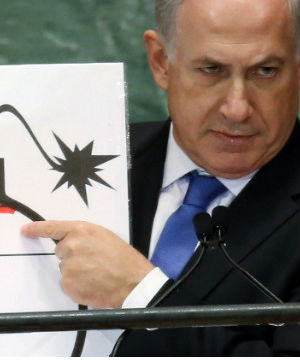 In an article titled, "How to help Iran build a bomb", famous US daily " New York Times" quoted scholars and military experts who argue that airstrike on Iran's nuclear facilities could actually lead Tehran to ensure realization of nuclear bomb.
In an article titled, "How to help Iran build a bomb", famous US daily " New York Times" quoted scholars and military experts who argue that airstrike on Iran's nuclear facilities could actually lead Tehran to ensure realization of nuclear bomb.
The writer William J. Broad revealed that a surprising number of experts argue that an airstrike on Iran's nuclear facilities could actually lead to Iran's speeding up its efforts, ensuring the realization of a bomb and hastening its arrival.
Scott D. Sagan, a political scientist at Stanford University's Center for International Security and Cooperation, said "an attack would increase the likelihood of an Iranian nuclear weapon."
Michael V. Hayden, director of the Central Intelligence Agency during the George W. Bush administration, recalled that the view among Bush's top advisors was that a strike "would drive them to do what we were trying to prevent."
According to these sources, such a move would free officials in Tehran of many constraints. "An attack, for instance, would all but certainly lead to the expulsion of international inspectors, which, in turn, would allow the government to undo hundreds of monitoring devices and safeguards, including seals on underground storage units."
According to the analysts, the thinking also goes that a strike would allow Iran to further direct its economy to military ends.
Perhaps the strongest argument is that an attack could unite all factions of the country and build an atmosphere of mobilizing rage.
"History," the analysts said, "demonstrates that airstrikes and military threats often result in unbending resolve among the beleaguered to do whatever it takes to acquire nuclear arms."
Mark Fitzpatrick, a senior nonproliferation official at the International Institute for Strategic Studies, a prominent London-based arms analysis group, told the NY Times that it was "almost certain" that a military strike on Iran would result in "a Manhattan-style rush to produce nuclear weapons as fast as possible."
According to the NY Times, nuclear historians stated that intimidation alone can spur an atomic response, as when American hostility prompted China to seek nuclear arms. Beijing succeeded in 1964 with a thunderous blast.
Foreign Policy magazine published a feature by Mark Perry, who served as the unofficial advisor of former Palestinian Authority Chairman Yasser Arafat in 1989-2004 and presented the Palestinian stance in interviews to US television stations
According to several high-level US military and civilian intelligence sources quoted by Perry, Pentagon war planners have had to "fly blind" in sketching out what "Israel" might do and have concluded that there are at least three possible "Israeli" attack options, including a daring and extremely risky special operations raid on Iran's nuclear facility at Fordow.
"All this stuff about 'red lines' and deadlines is just "Israel's" way of trying to get us to say that when they start shooting, we'll start shooting," retired Admiral Bobby Ray Inman was quoted as saying.
"Bottom line? We can do this and they can't, because we have what the "Israelis" don't have," said retired Air Force Colonel Sam Gardiner.

















